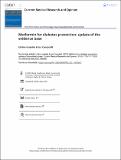Files in this item
Metformin for diabetes prevention : update of the evidence base
Item metadata
| dc.contributor.author | Hostalek, Ulrike | |
| dc.contributor.author | Campbell, Ian | |
| dc.date.accessioned | 2021-10-11T11:30:10Z | |
| dc.date.available | 2021-10-11T11:30:10Z | |
| dc.date.issued | 2021-10 | |
| dc.identifier | 276240412 | |
| dc.identifier | 76d23183-dca7-4173-a65f-d0a3d6d0d93a | |
| dc.identifier | 85111704814 | |
| dc.identifier | 000678388800001 | |
| dc.identifier.citation | Hostalek , U & Campbell , I 2021 , ' Metformin for diabetes prevention : update of the evidence base ' , Current Medical Research and Opinion , vol. 37 , no. 10 , pp. 1705-1717 . https://doi.org/10.1080/03007995.2021.1955667 | en |
| dc.identifier.issn | 0300-7995 | |
| dc.identifier.other | Jisc: cffdc36ed68d4031b436cdb6c08ddc11 | |
| dc.identifier.uri | https://hdl.handle.net/10023/24108 | |
| dc.description | Manuscript writing fees and publication fees for this manuscripts are being paid by Merck Healthcare KGaA, Darmstadt, Germany. | en |
| dc.description.abstract | We have conducted a narrative review based on a structured search strategy, focusing on the effects of metformin on the progression of non-diabetic hyperglycemia to clinical type 2 diabetes mellitus. The principal trials that demonstrated a significantly lower incidence of diabetes in at-risk populations randomized to metformin (mostly with impaired glucose tolerance [IGT]) were published mainly from 1999 to 2012. Metformin reduced the 3-year risk of diabetes by −31% in the randomized phase of the Diabetes Prevention Program (DPP), vs. −58% for intensive lifestyle intervention (ILI). Metformin was most effective in younger, heavier subjects. Diminishing but still significant reductions in diabetes risk for subjects originally randomized to these groups were present in the trial’s epidemiological follow-up, the DPP Outcomes Study (DPPOS) at 10 years (−18 and −34%, respectively), 15 years (−18 and −27%), and 22 years (−18 and −25%). Long-term weight loss was also seen in both groups, with better maintenance under metformin. Subgroup analyses from the DPP/DPPOS have shed important light on the actions of metformin, including a greater effect in women with prior gestational diabetes, and a reduction in coronary artery calcium in men that might suggest a cardioprotective effect. Improvements in long-term clinical outcomes with metformin in people with non-diabetic hyperglycemia (“prediabetes”) have yet to be demonstrated, but cardiovascular and microvascular benefits were seen for those in the DPPOS who did not vs. did develop diabetes. Multiple health economic analyses suggest that either metformin or ILI is cost-effective in a community setting. Long-term diabetes prevention with metformin is feasible and is supported in influential guidelines for selected groups of subjects. Future research will demonstrate whether intervention with metformin in people with non-diabetic hyperglycemia will improve long-term clinical outcomes. | |
| dc.format.extent | 13 | |
| dc.format.extent | 1765233 | |
| dc.language.iso | eng | |
| dc.relation.ispartof | Current Medical Research and Opinion | en |
| dc.subject | Type 2 | en |
| dc.subject | Metformin | en |
| dc.subject | Prediabetic state | en |
| dc.subject | Glucose intolerance | en |
| dc.subject | Diabetes mellitus | en |
| dc.subject | RA0421 Public health. Hygiene. Preventive Medicine | en |
| dc.subject | RM Therapeutics. Pharmacology | en |
| dc.subject | 3rd-DAS | en |
| dc.subject | SDG 3 - Good Health and Well-being | en |
| dc.subject | NIS | en |
| dc.subject.lcc | RA0421 | en |
| dc.subject.lcc | RM | en |
| dc.title | Metformin for diabetes prevention : update of the evidence base | en |
| dc.type | Journal article | en |
| dc.contributor.institution | University of St Andrews. School of Medicine | en |
| dc.identifier.doi | 10.1080/03007995.2021.1955667 | |
| dc.description.status | Peer reviewed | en |
This item appears in the following Collection(s)
Items in the St Andrews Research Repository are protected by copyright, with all rights reserved, unless otherwise indicated.

